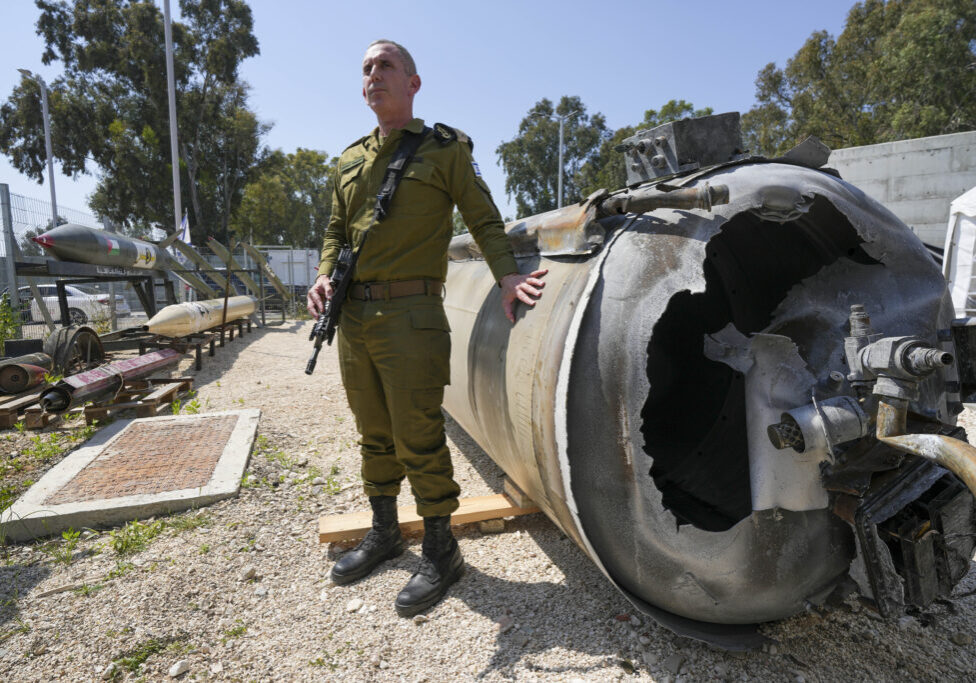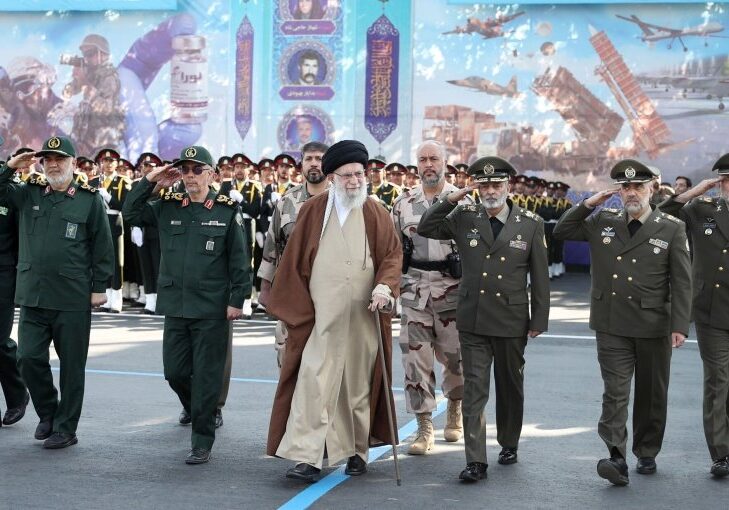Australia/Israel Review
Behind The News: Palestinian Civil War Watch
Jun 1, 2006 | AIJAC staff
Palestinian Civil War Watch
Tensions leading to a possible civil war in the Palestinian Authority between Hamas and Fatah are becoming more evident after the British newspaper, The Sunday Times, revealed on May 7 that Israeli intelligence foiled a Hamas plot to assassinate Palestinian President Mahmoud Abbas.
The assassination was planned by Hamas’ military wing, the Izz a-Din al-Qassam Brigades, who intended to kill Abbas at his Gaza office. Abbas cancelled his planned trip to Gaza after the Israelis formally warned him of the plot. It is understood that the attack would also have targeted Mohammed Dahlan, Abbas’ strongman in Gaza.
 |
| New Order: Hamas security forces in Gaza |
On May 8, a day after the assassination plot was revealed, the worst internecine fighting between Fatah and Hamas since the latter won the election in January broke out in Khan Yunis. Two Fatah fighters and one Hamas fighter were killed and 11 people were wounded in the clash.
On May 16, unidentified gunmen shot dead a senior member of Hamas’ military wing, as he was driving near Haniyeh’s office in Gaza city. No one claimed responsibility for the attack.
Further clashes erupted in Gaza two days later, after Abbas ordered the Hamas-led government to immediately remove its newly formed 3,000 strong security force from the streets of Gaza. The gun battle erupted in front of the Palestinian parliament building and sent terrified residents fleeing from the streets of Gaza City. At least four people were wounded in the gun battle, including two police, one Hamas security force member and a gunman from Abbas’ Fatah movement.
On May 21, PA security forces announced that they had thwarted an attempt to assassinate Rashid Abu Shabak, their overall commander and a Fatah leader. According to the security forces, a large 70-kilogram bomb was discovered on Sunday morning next to Abu Shabak’s home in Gaza City.
Further fighting occurred close to the Parliament on May 22, claiming the life of a driver at the Jordanian diplomatic mission in Gaza. In response, Jordan threatened to close its embassy and recall its ambassador in Gaza, unless Fatah and Hamas put an end to the daily clashes. Another confrontation between rival gunmen occurred on May 23 after Palestinian Authority Foreign Minister Mahmoud Zahar allegedly spat in the face of a PA policeman who insulted him at a border crossing. The following day, three Hamas operatives were reportedly kidnapped outside a Gaza mosque and shot and wounded.
Al-Qaeda infiltration of West Bank and Gaza
More evidence has recently emerged showing that al-Qaeda may be stepping up its activities in the PA by linking up with Hamas, after leaflets threatening to kill Palestinian leader Mahmoud Abbas and other top Fatah leaders were distributed by a group claiming to have ties with al-Qaeda’s leader in Iraq, Abu Musab al-Zarqawi.
The leaflets were signed “al-Tawhid al-Jihad of the Levant and Egypt,” the group that took responsibility for the April 26 suicide attacks in Sinai, which killed 24 people, as well as an attack against police and international peacekeepers in northern Sinai two days later. The same group was also responsible for bombing attacks in Sharm el-Sheikh on July 23, 2005 where 88 people were killed.
The Egyptian Interior Ministry has alleged that Yousri Mohareb and his two brothers, part of the group the authorities have blamed for the series of attacks, had received weapons and bomb-making training in the Palestinian territories. Another of the suspected plotters of the April Sinai attacks is said to have been granted refuge in Gaza by the Hamas-led Palestinian government.
On May 20, Palestinian intelligence chief Tarek Abu Rajab, an Abbas ally, was seriously wounded by a bomb in the lift of his office, which killed a bodyguard and wounded five other people.
On May 21, a group calling itself “al-Qaeda in Palestine” claimed responsibility for the assassination attempt on Gaza official Tarek Abu Rajab, as noted above. In a leaflet distributed in the Gaza Strip, “al-Qaeda in Palestine” also threatened to kill other “apostate” PA officials, including Abbas.
Still Toon-ing In
The wave of anger over the controversial cartoons of the Prophet Mohammed has continued, almost a year after they first appeared in Danish newspaper Jyllands-Posten.
In early May a video of al-Qaeda member Mohammed Hassan was posted on the internet, calling upon Muslims to attack Denmark, Norway and France for publishing cartoons of the Prophet Mohammed.
“Muslims avenge your prophet… We deeply desire that the small state of Denmark, Norway and France…are struck hard and destroyed,” declared Hassan, a Libyan national, who had escaped from US custody at Bagram airbase in Afghanistan last July.
In India, Samajadawi Party leader Beni Prasad Verma announced he would give half his property to the first person to kill one of the cartoonists. Verma’s comments, on May 6, followed similar remarks made by Haji Yaqoob Qureshi, the minister for Haj in the Indian province of Uttar Pradesh. Qureshi had promised a reward of 510 million rupees (A$14.7 million) for the beheading of one of the cartoonists.
An Internet journal published by an Islamist group with members in Europe has also called on Muslims to take action against the cartoonists. In early May, the journal of Ansar al-Sunna (which is outlawed as a terrorist organisation in Australia), listed the names of European newspapers that reprinted the cartoons. The journal added, “While it may prove difficult to make all Muslims carry out the divine verdict in this matter…the path of jihad against the enemies of God is still available.”
Meanwhile the funeral in Pakistan of Pakistani-German Muslim Amir Cheema attracted more than 50,000 people. Mr Cheema had been arrested in Germany in March as he tried to enter the office of Axel Springer, the editor of German newspaper Die Welt, with the alleged intention of trying to kill him because of Die Welt’s publication of the cartoons. He subsequently hanged himself in his prison cell. Most of the mourners at the funeral were clearly there to honour Cheema for his attempted revenge attack against Springer.
Conversion Factor
According to Iranian President Ahmadinejad, his letter to US President George W Bush in early May was not, as widely implied in the news, a call for negotiations over the nuclear dispute, but was rather an invitation for Bush to convert to Islam and “the Prophet’s culture.” This is according the official Iranian news agency IRNA (May 12).
Interestingly, last November a senior Iranian cleric, Hojatolislam Mohammad Reza Hakimi, was quoted as saying that he had given Cuba’s Fidel Castro a Spanish translation of some Islamic texts and “almost managed to convince him to become a Muslim.” “Castro,” Hakimi added, “is certain that Cuba is suffering from a lack of spirituality, and seems very interested in Islam, above all in the writing of Iran’s revolutionary leader, Ayatollah Khomeini.”
![]()
Tags: Islamic Extremism






